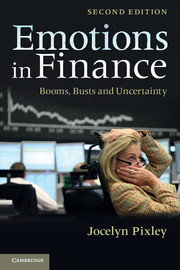Book contents
- Frontmatter
- Contents
- Acknowledgements
- Abbreviations
- Interviews
- Introduction
- 1 Modern money, modern conflicts
- 2 Corporate suspicion in the kingdom of rationality
- 3 Financial press as trust agencies
- 4 Required distrust and the onus of a bonus
- 5 Managing credibility in central banks
- 6 Hierarchies of distrust from trust to bust
- 7 Overwhelmed by numbers
- 8 The time-utopia in finance
- 9 Taming the god of opportunism
- References
- Index
1 - Modern money, modern conflicts
Published online by Cambridge University Press: 05 June 2012
- Frontmatter
- Contents
- Acknowledgements
- Abbreviations
- Interviews
- Introduction
- 1 Modern money, modern conflicts
- 2 Corporate suspicion in the kingdom of rationality
- 3 Financial press as trust agencies
- 4 Required distrust and the onus of a bonus
- 5 Managing credibility in central banks
- 6 Hierarchies of distrust from trust to bust
- 7 Overwhelmed by numbers
- 8 The time-utopia in finance
- 9 Taming the god of opportunism
- References
- Index
Summary
Money is our most future-oriented and creative institution; its social promise is always contingent. Money is produced and used through trust, but trust is distant and money's usefulness is fragile. Only when there was a ‘run’ on an obscure English bank, Northern Rock in 2007, and when the payment system stopped after Lehman Brothers went bankrupt in 2008, was the ‘double-sided’ fragility of money and banks obvious. Banks produce most of the world's money through trusting their loans will be honoured, and they normally make profits this way. Their licence to create the money we all use needs banks to be trustworthy so they will honour their liabilities. In 2008 banks did not meet their promises to each other, notably in the USA and Britain; they damaged this trust in money.
The financial sector most dominated by London and NYC has pursued one aspect of money as a commodity to make profits, under their governments’ encouragement. The two centres compete as well. To ‘care’ for the promises in creating money seems lost behind benchmarks and competitive rankings. Although money is promise, the sector is obsessed with a controllable future, a ‘new’ method to expunge the last mistake. No sensible, social questions about promises are asked like ‘Can firms pay back their bank loans?’ Instead this sector asks market questions for quick profits. ‘Will the hedges and insurance against default, the commodity price, its derivatives and so on, rise or fall in value?’
- Type
- Chapter
- Information
- Emotions in FinanceBooms, Busts and Uncertainty, pp. 8 - 35Publisher: Cambridge University PressPrint publication year: 2012
- 1
- Cited by



